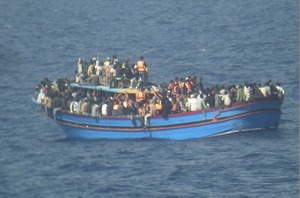- About
- Topics
- Picks
- Audio
- Story
- In-Depth
- Opinion
- News
- Donate
- Signup for our newsletterOur Editors' Best Picks.Send
Read, Debate: Engage.
| located: | Italy |
|---|---|
| editor: | Vanessa Ellingham |
Three boats carrying migrants across the Mediterranean have been shipwrecked in recent days, with 700 people presumed dead.
The few survivors of the worst incident told police that when those on board objected to being transfered to a second boat which looked even less seaworthy than the first, smugglers responded by ramming the boat, sabotaging the journey.
While an investigation from both police and the International Organisation for Migration must certainly take place, it is not enough to simply reduce these incidents to crimes.
"Many factors feed into boat migration," writes Judith Sunderland at Human Rights Watch. "... fear of persecution in Eritrea, dying under bombs in Syria and Gaza, drought and lawlessness in Somalia, poverty and conflict in South Sudan, and similar causes in scores of other places.
"The lies and threats of traffickers, the breakdown of societies, and the economic disparities can seem impossible to tackle in a meaningful, humane way. But here are two concrete ways the European Union can reduce the odds of another tragedy at sea."
The first she names is that the EU must create safer legal ways for asylum seekers to reach Europe - by seeking protection through official means rather than attempting dangerous sea crossings.
"To date, EU policies have focused largely on enforcing borders – keeping people out – rather than ensuring access to safety for those who need it. The EU Home Affairs Commissioner asked the member states in July to consider humanitarian visas or allow asylum applications in third countries. Both ideas merit adoption."
Sunderland also urges the EU not to downgrade its rescue efforts in the Mediterranean. " The Italian Navy operation Mare Nostrum, launched last October after two deadly shipwrecks, has brought tens of thousands of people safely to Italian shores. Critics say the operation has encouraged boat migration, yet more than half of those who have made the journey are fleeing human rights abuse in Eritrea and war in Syria. The prospect that Mare Nostrum will be replaced soon by “Frontex Plus,” a far more limited operation by the EU’s border agency, raises the specter of a rising death toll (already at nearly 3,000 so far this year)."
"Going after the criminals directly responsible for hundreds of deaths is important. Changing EU policies to prevent thousands more is vital."
